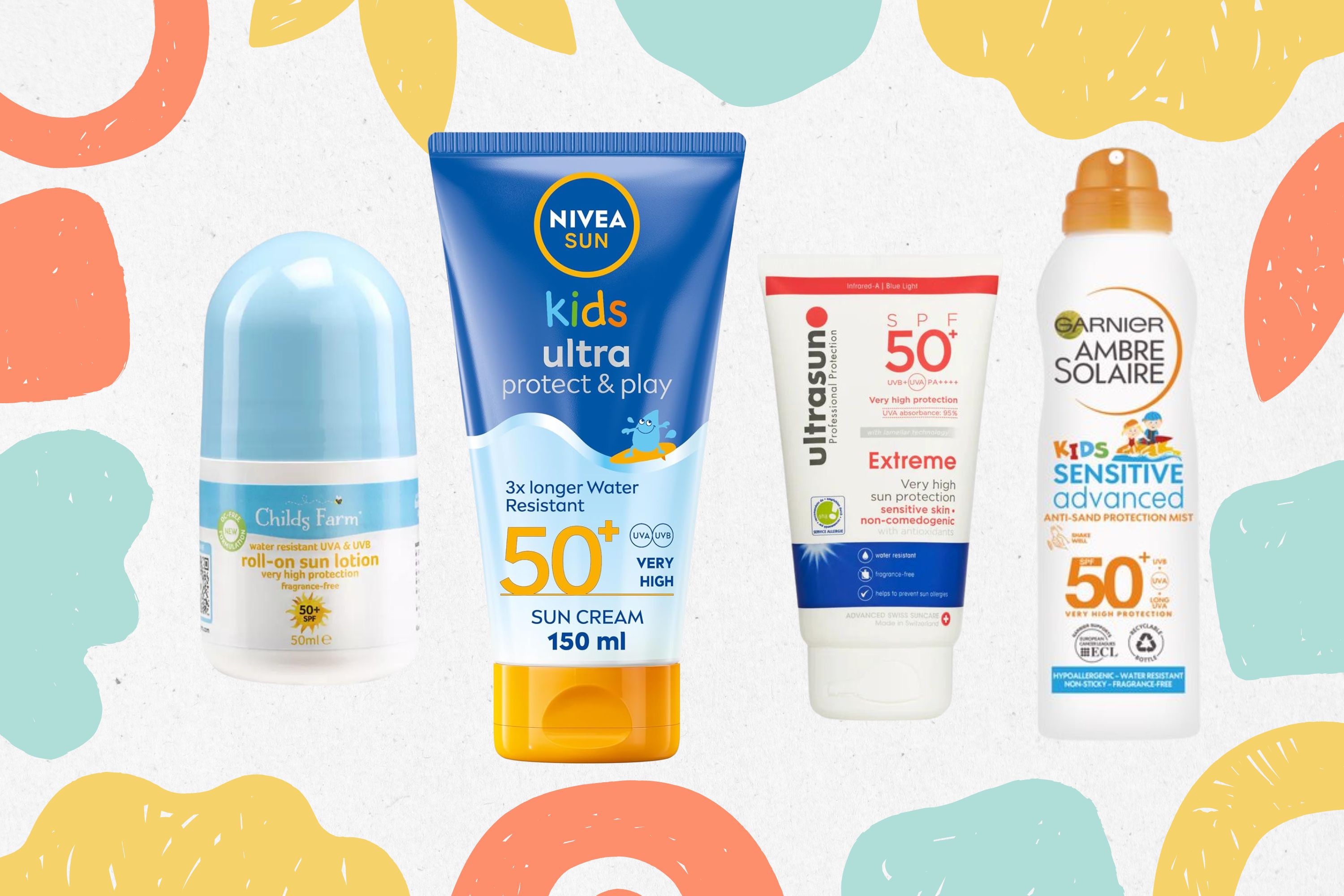
The best sun creams will keep you protected without leaving a sticky white cast on your skin. Here are our top picks - based on testing and recommendations from experts.
The UK has experienced sweltering temperatures this summer, and all of us are looking for the best sun cream to suit our skin. Be it the best sunscreen for kids or choosing the right sunscreen for your face, qualities like SPF, UV protection and water resistance are all things we need to think about - otherwise you'll find yourself looking for sunburn remedies. Plus, in some cases too much exposure to UV can lead to skin cancer.
Dr Catherine Borysiewicz, dermatology consultant at King Edward VII's Hospital told us: "The choice of sunscreen options can appear overwhelming, but the most important aspects to look at are the UVA star rating and SPF level, which will indicate the level of protection the sunscreen can offer - and generally speaking the higher the number the better protected you’ll be." We've taken her advice into account - as well as that of other skincare experts - and put together this list of the best suncreams for 2024.
How we tested the best sun creams
We spent weeks putting these sun creams to the test, using products on our skin to see how the formula settled and testing their performance in the sun, during exercise and in the water. We've also spoken to dermatologists and researched each product extensively, so we could assess its UV protection, how long it lasts and which skin type each is best suited to.
15 best sun creams 2024:
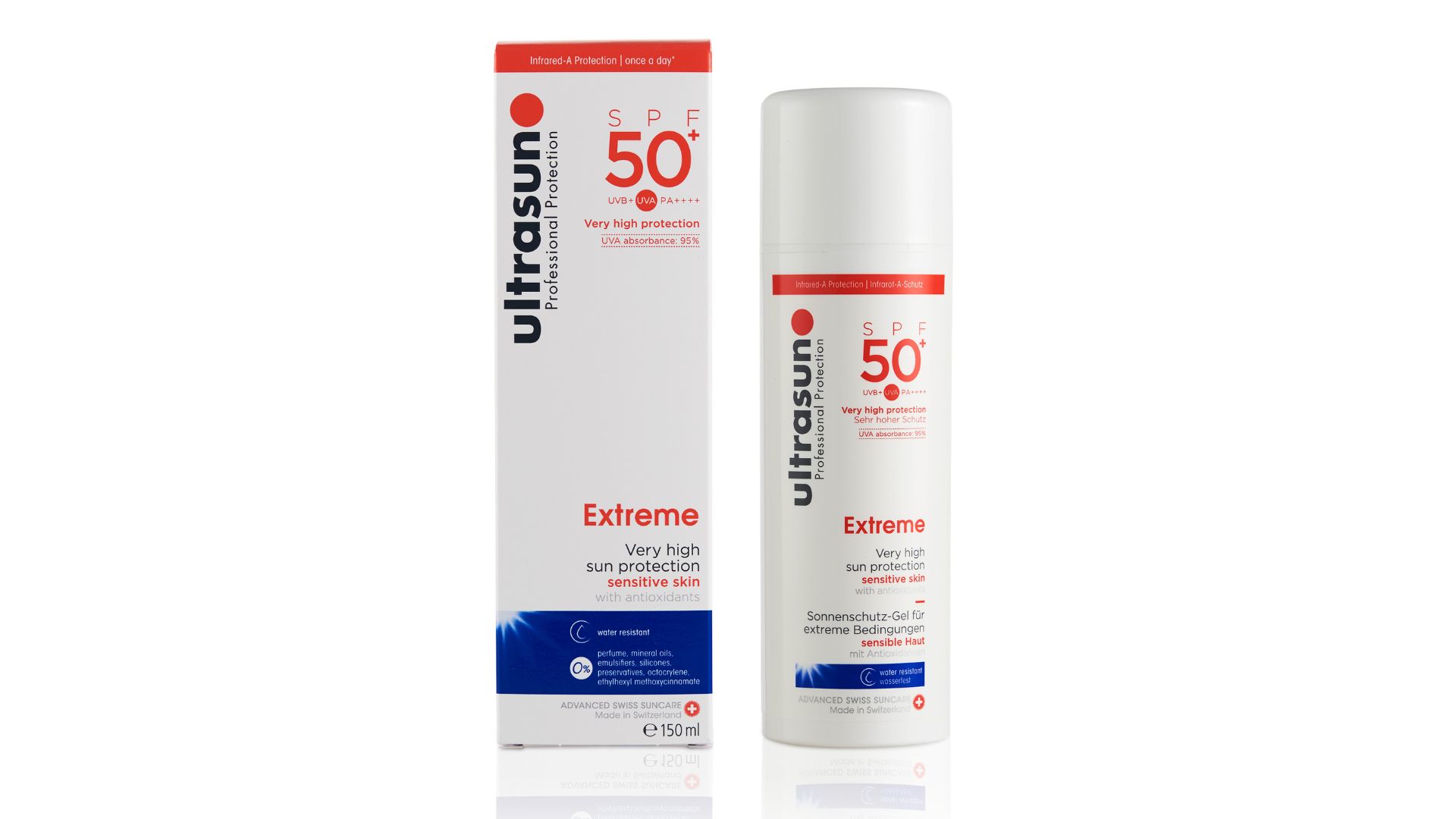
The brand’s patented lamellar technology delivers protection that is long-lasting. It works by applying filters in fine layers that bond with the skin evenly, and sit just below the skin’s surface so there's no greasy feeling. This is a hybrid sunscreen, meaning it contains both physical filters and chemical absorbers.
GoodtoKnow verdict: "For children it’s crucial that a formula is both sensitive and has a very high UVB and UVA protection," says Abi Cleeve, beauty expert and founder of Ultrasun. "Our Extreme 50+ gives very high protection from both, the UVA filter is over 95% compared to an EU standard of 33%."
Our Beauty Editor Stephanie Maylor says, "Ultrasun is the only sunscreen that my husband will wear, which says a lot about how comfortable it is to apply. It is expensive, but for me, it's always been a godsend on hot beach breaks and helped me to avoid prickly heat."
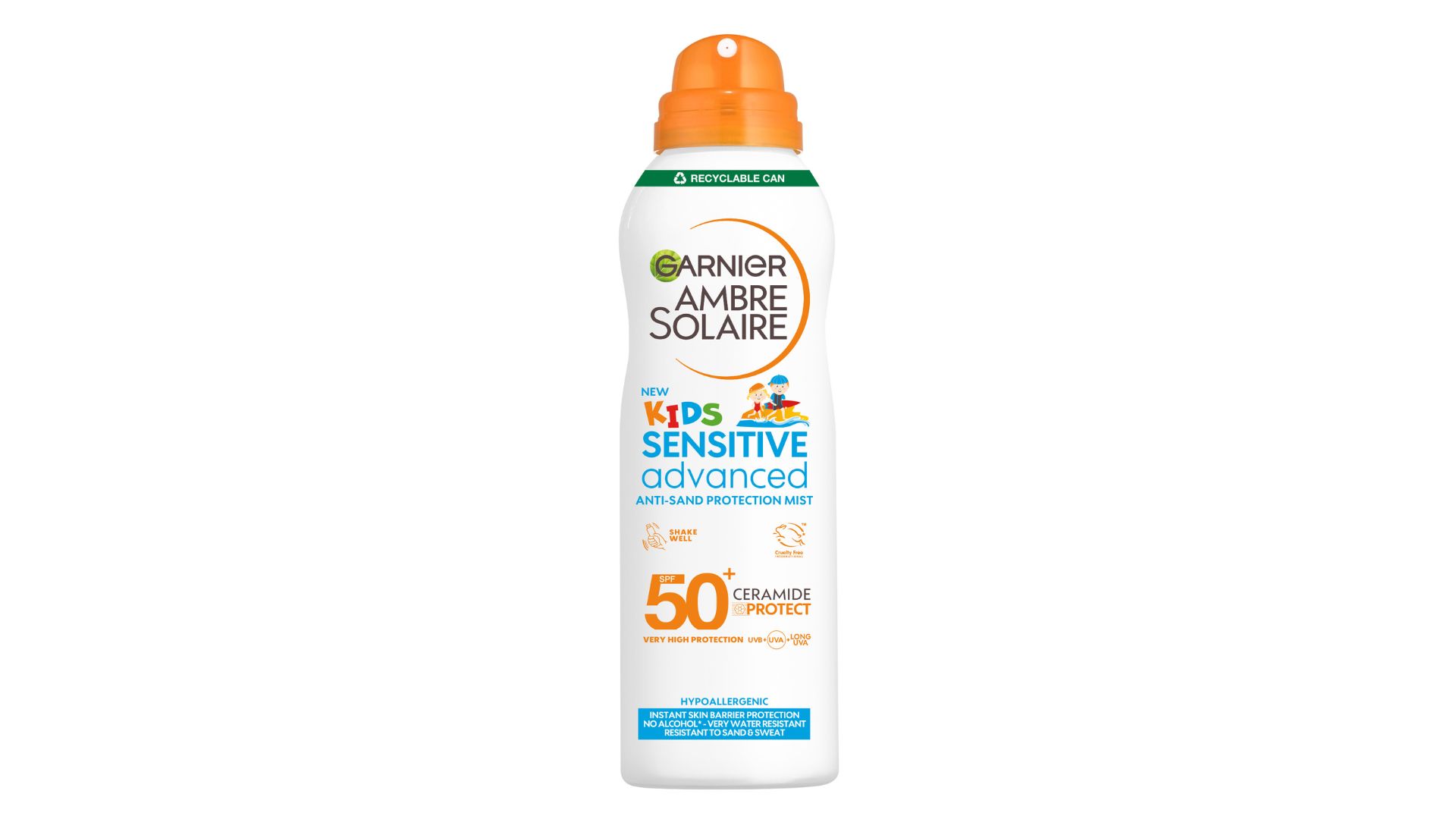
Garnier Ambre Solaire is a trusted brand for many of us, and their research is recognised by the British Skin Foundation. Although this is labelled as a kids' formula, the lightweight, refreshing mist will appeal to adults, too. It's quick-drying, leaves no white marks and it's water-, sand- and sweat-resistant. Plus, the new formula is powered by ceramide to help support the skin barrier, locking in moisture to keep skin happy and healthy.
GoodtoKnow verdict: Beauty Editor Stephanie says, "During the summer term, this sunscreen mist lives by the front door so I can give the children a good blast before school. It's like an assembly line. It's so light and much less messy than lotion, especially when you're in a hurry, and you can spray it from any angle. The fact that my children are actually happy to stand and have this applied speaks volumes. And so far, their white socks and polo shirts have avoided that yellow tint. Win win!"
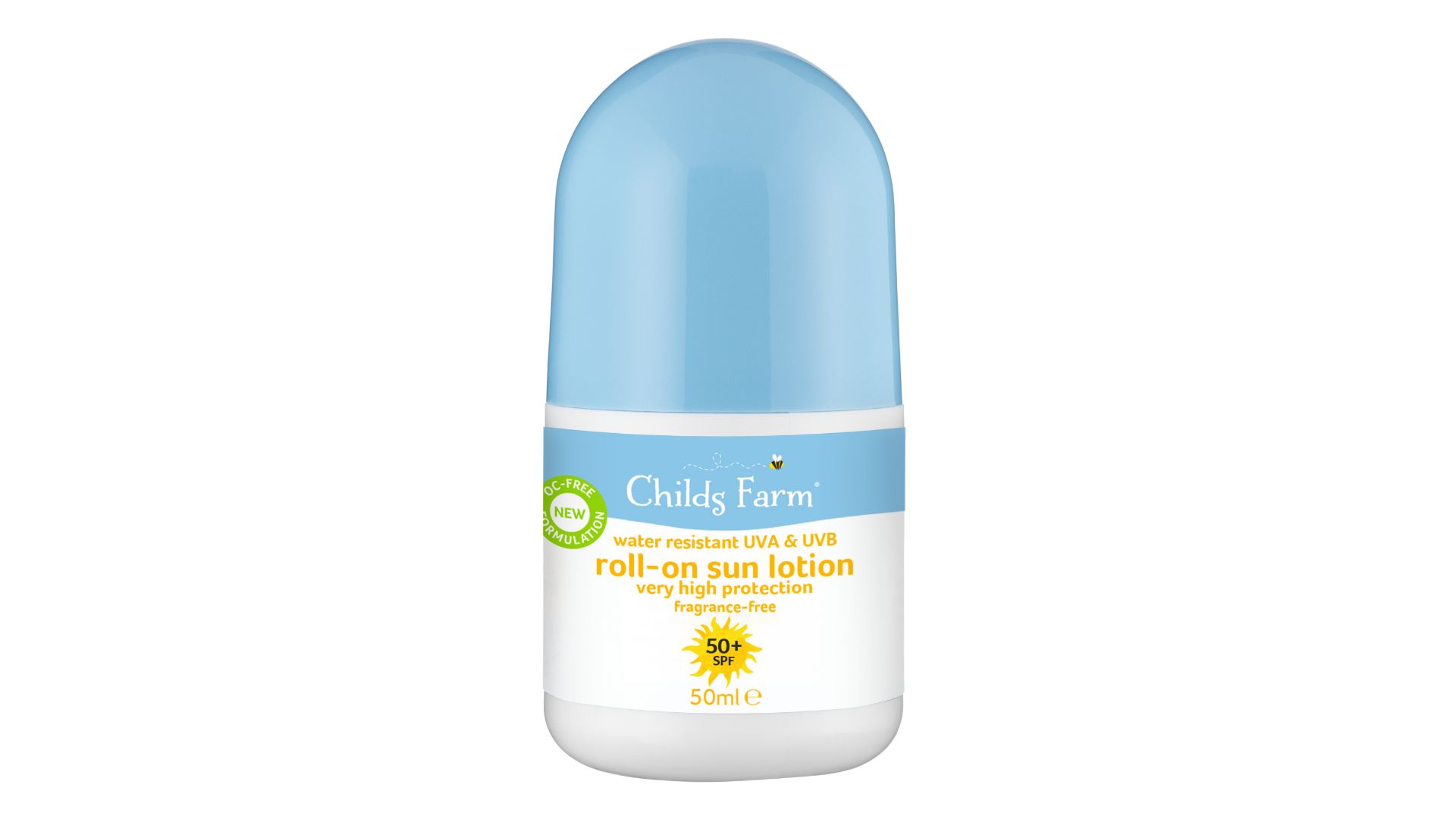
Roll-ons are great for wriggly babies and toddlers who won't sit still. Childs Farm's formulations are developed with little ones' delicate skin in mind, and the entire range is dermatologist and paediatrician approved. Gentle this may be, but it provides very high SPF50+, broad-spectrum protection that is water-resistant. The new formulas are octocrylene-free so they're kind to the ocean, too. Just remember, babies under six months should be kept out of the sun entirely.
GoodtoKnow verdict: Beauty Editor Stephanie says, "Anything that's going to make it slightly easier to get sunscreen on my little one is a winner in my house. I like the roll-on format - it can be a little tricky to get going but once it's flowing it gives good coverage."
GP, Dr Anita Sturnham is a fan of this sunscreen: "The roll on is perfect for those harder to reach areas and great to allow your child to pack in their bag and apply themselves throughout the day. It is perfect for quick, fuss free application when we are on the go."
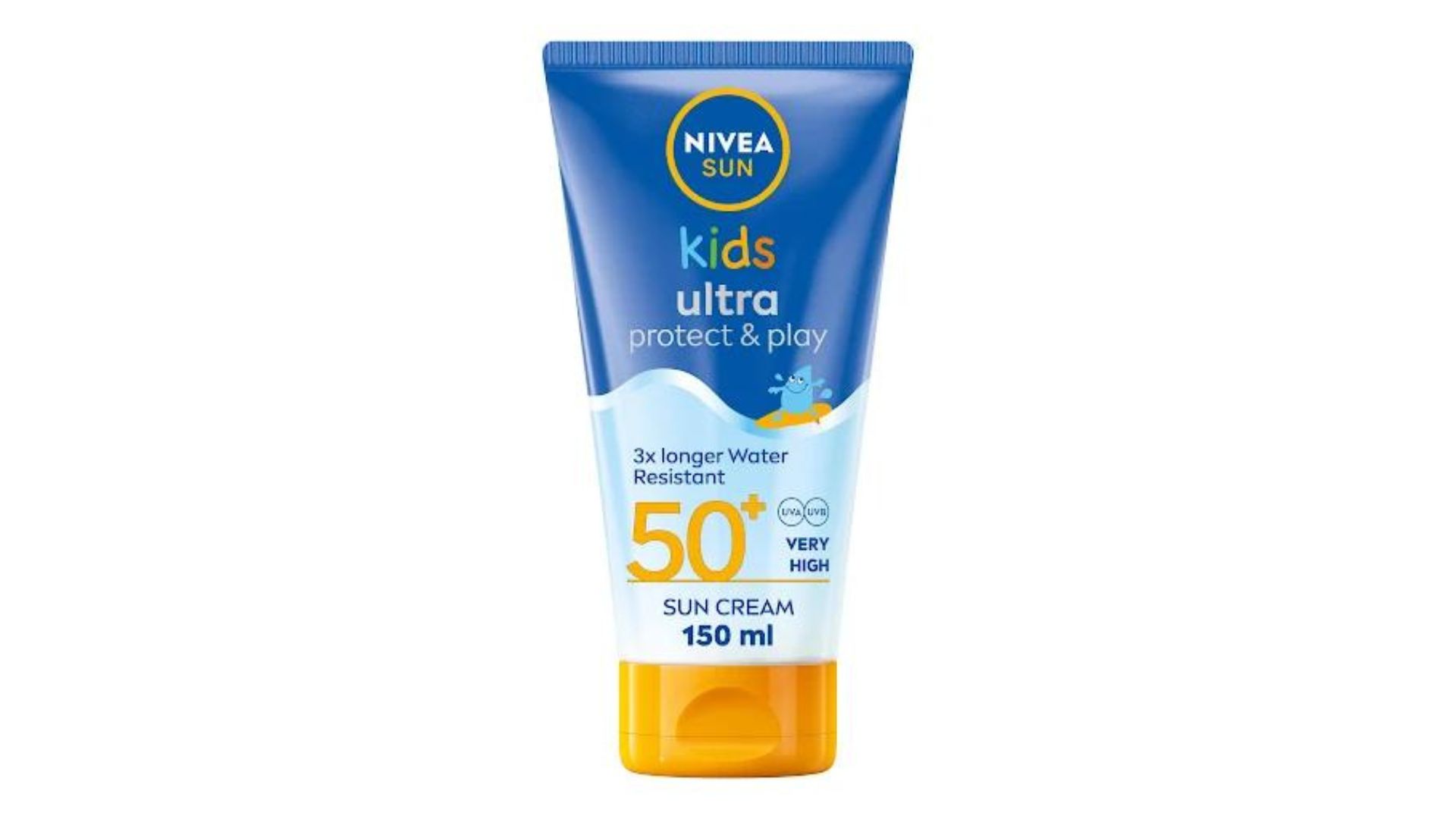
Nivea enjoys a reputation as one of the best sun cream brands out there, so it's no surprise that their products make it on to our list of the best sun creams. This particular formula includes organic almond oil, making it ideal for those with sensitive skin. It promises brilliant sand-, sweat- and water-resistance, so it's great for active kids and adults on the beach.
GoodtoKnow verdict: Beauty Editor Stephanie says, "If ever I get caught in the sun and need to purchase an emergency sun cream, I'll always go for Nivea - they're a trusted sun care brand for me, and the smell is so nostalgic. This lotion is a little on the thick side, but that's not necessarily a bag thing - I could tell my daughter was getting a good coating of protection and within a few minutes, any white smears left on the skin had soaked in."
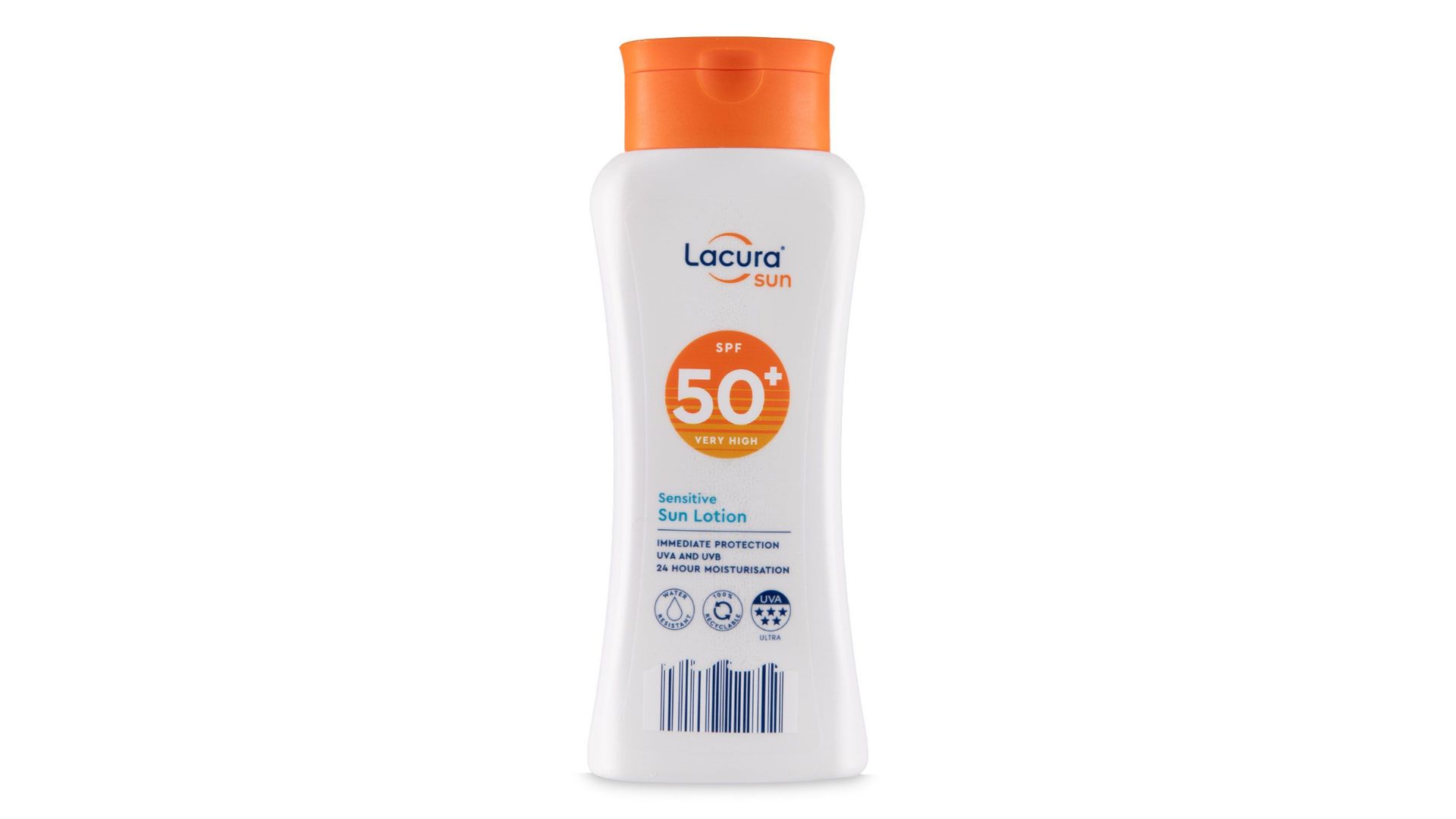
At £2.89 for a 200ml bottle, this sun cream is a great budget buy without compromising on protection - it has a 5-star UV rating and is designed for sensitive skin types. Aldi also offers formulations for kids as well as smaller 50ml bottles, which are great for when you're out and about. Our tester chooses the Kids Coloured Sun cream, but notes that the Clear Sun Spray is more forgiving if it happens to get accidentally sprayed on a white item of clothing.
GoodtoKnow verdict: Beauty Editor Stephanie says, "I’ve been using Aldi’s Lacura suncream on the kids for years now. My son suffers from eczema flare-ups and after trialling a few different creams, this was the one that his skin could handle the best. It’s a tad thick and white, which the kids do get a little aggravated about, but I often apply before getting fully dressed so it has time to sink into their skin. It sinks without leaving a tacky, or chalky feeling and ensures we don't burn."
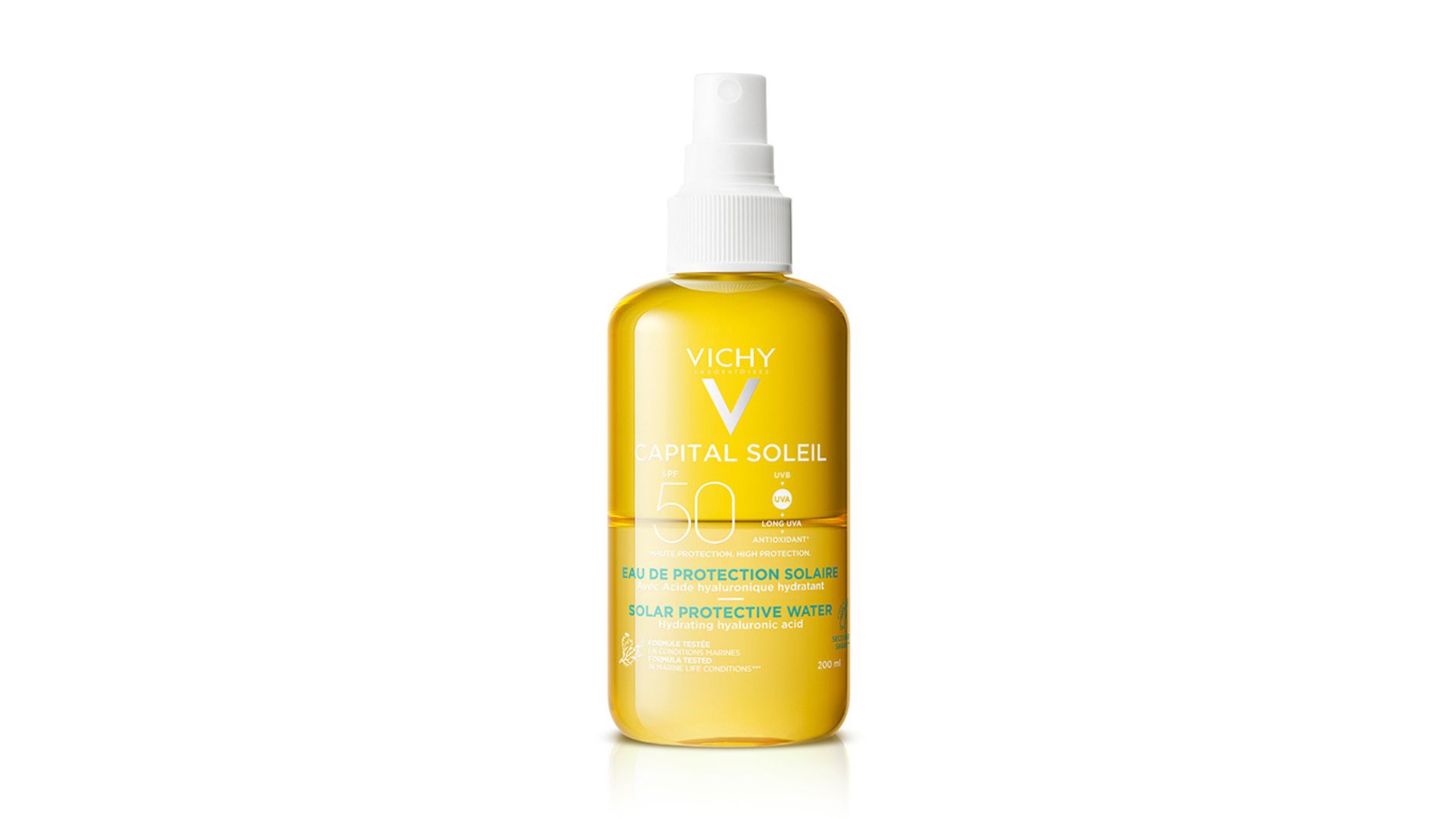
If you have dry, sensitive skin or hate the tacky-feel of some sun lotions, you'll understand why we've included Vichy Protective Water in our list of the best sun creams. This unique bi-phase oil-water formula is enriched with hyaluronic acid and 40% Vichy Mineralizing Water to keep skin quenched, hydrated and plump while in the sun. Light it may be, but it provides a sturdy defence with SPF50, broad-spectrum protection.
GoodtoKnow verdict: Beauty Editor Stephanie says, "What an absolute joy to use! This solar water is incredibly refreshing and lightweight - it absorbs within seconds, but left my legs, which can often feel dry, soft, smooth and gleaming. My skin felt safe during the recent heatwave, and it didn't leave those annoying yellowy stains on my outdoor cushions."
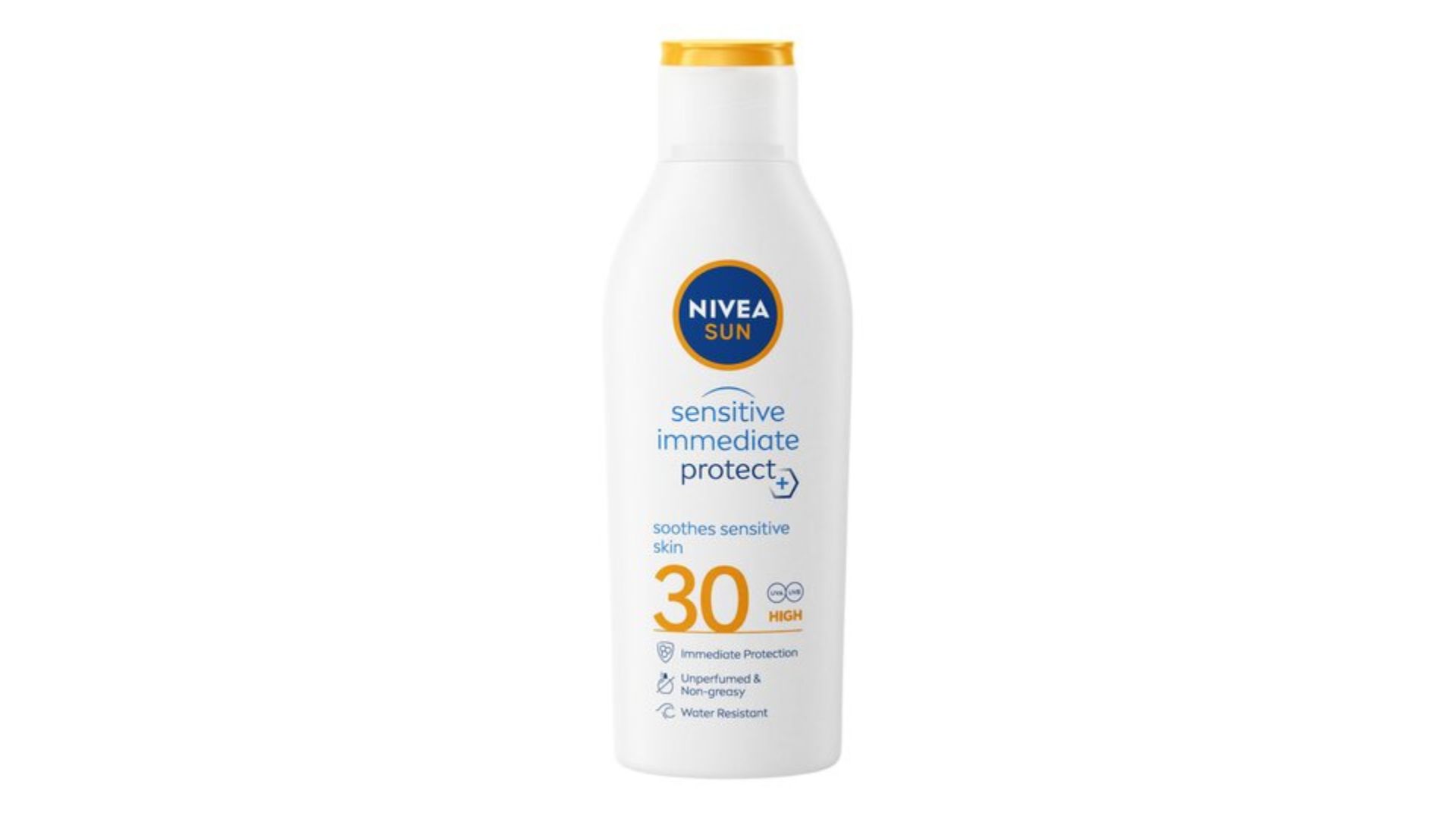
Nivea enjoys a reputation as one of the best sun cream brands out there, so it's no surprise that their products make it on to our list of the best sun creams. This particular formula includes Aloe Vera and Jojoba Oil, making it ideal for those with sensitive skin, and it's fragrance-free and water resistant too. If you're not a fan of lotion, they have a sun cream spray in the same range, as well as a version specifically formulated for kids. However, with a four star UV rating, there are some sun creams out there that will leave you better protected from UVA rays.
GoodtoKnow verdict: Beauty Editor Stephanie says, "This lotion is a great consistency - not too runny but also not too thick - and applies to the skin evenly. However, it does leave a slightly tacky feeling on the surface of my skin."
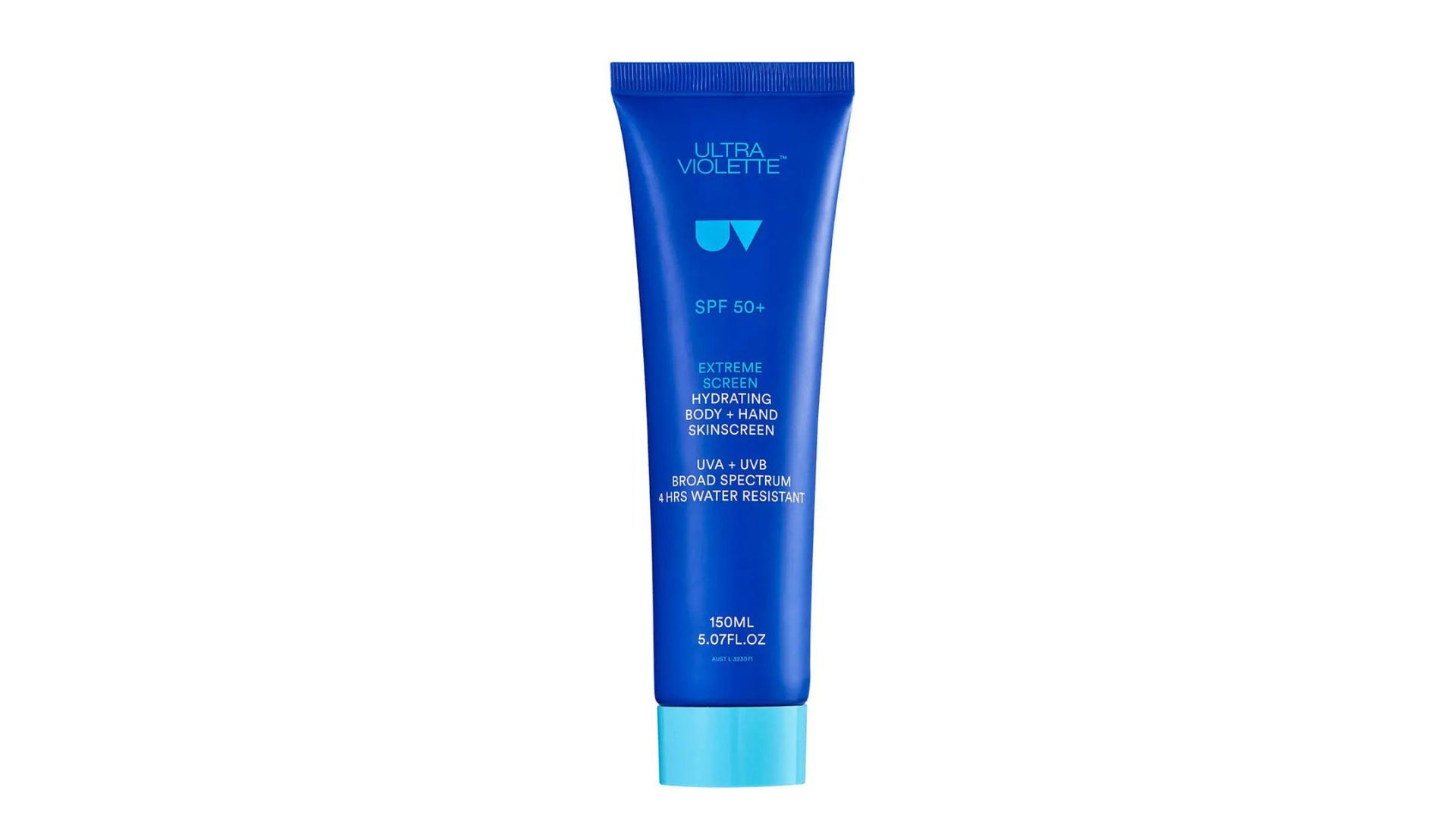
It's no secret that Aussies know how to do sun cream right, and Ultra Violette is no exception. Enriched with nourishing and hydrating ingredients, this sunscreen is water and sweat resistant without leaving any greasy or sticky residue. It's the priciest product on our list, but you're getting what you pay for in terms of sun protection - and if you have sensitive or acne-prone skin too, we think it's a winner.
GoodtoKnow verdict: GoodtoKnow writer Sarah Handley, says, "This is my favourite sunscreen of all time. I’m super pale, have freckles and burn really easily. But there’s something in a lot of sunscreens that tends to break me out so I always dreaded using it, especially on my face. And I've wasted so much money on the hunt for the perfect SPF. Ultra Violette has changed the game for me.
"It’s super easy to apply, sinks in well and doesn’t cause me to break out. The hand and body sunscreen leaves a comfortable non-sticky glow, and I love that it’s SPF 50+ - I’ve not burned at all since using it. It’s not cheap, but for me, it’s worth spending a bit more on a formula that works with my skin type."
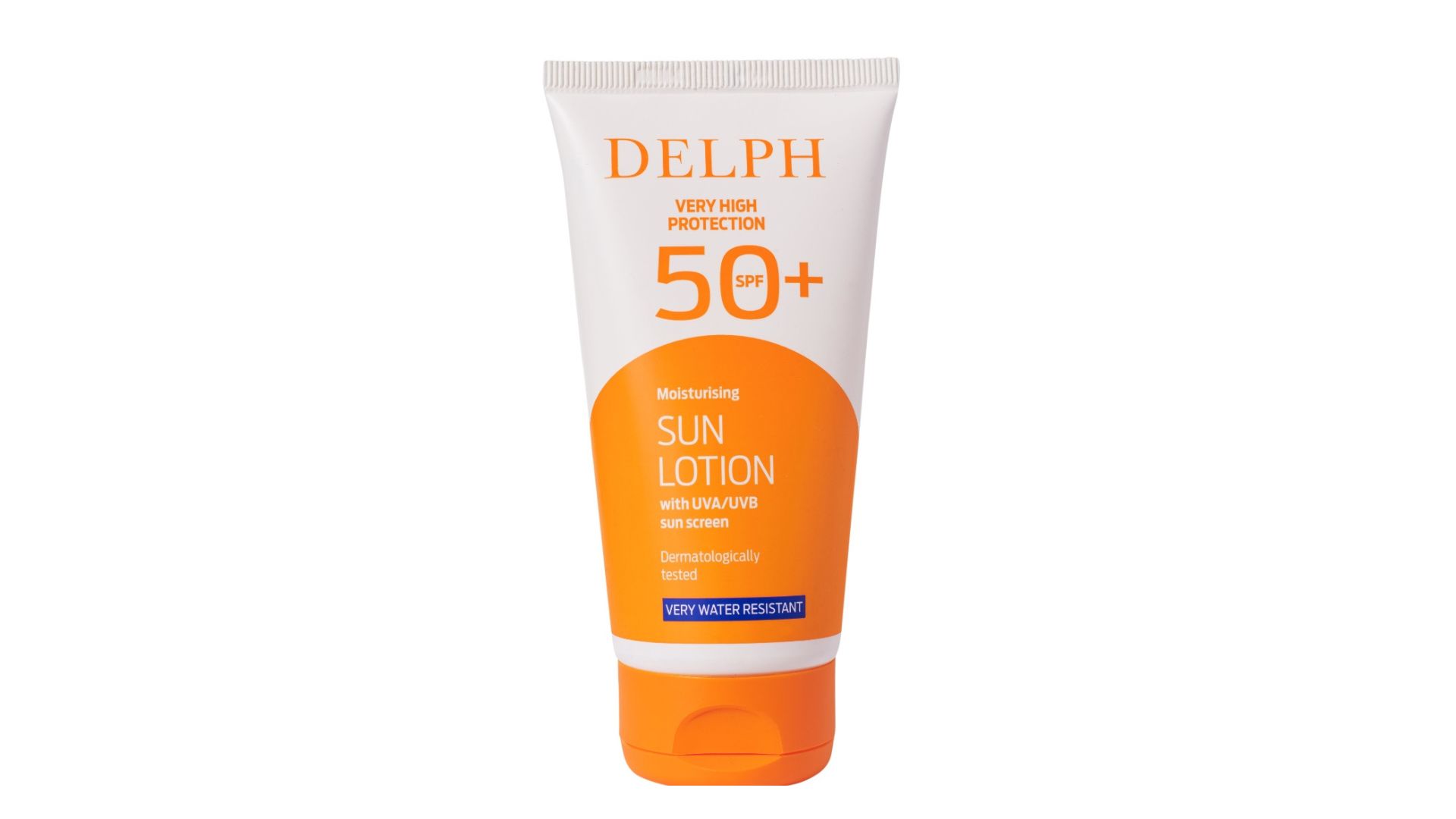
You may not have heard of Delph but interestingly, it's the official sun protection supplied to the British Army so you'd expect it to be a tough, water- and sweat-resistant option. It's dermatologically-tested and recommended by the NHS for those with medical skin conditions.
GoodtoKnow verdict: Our Beauty Editor, Stephanie says, "This is a gorgeously silky and lightweight lotion, which unsurprisingly, absorbs quickly and effortlessly. There's a zesty lemon fragrance, which I quite liked, but it might remind others of bathroom cleaner. Scent aside, it's so skin-quenching, and did a stand-up job of protecting my skin, even when I was working up a sweat painting our raised beds during a mini UK heatwave and being squirted with water guns by my children."
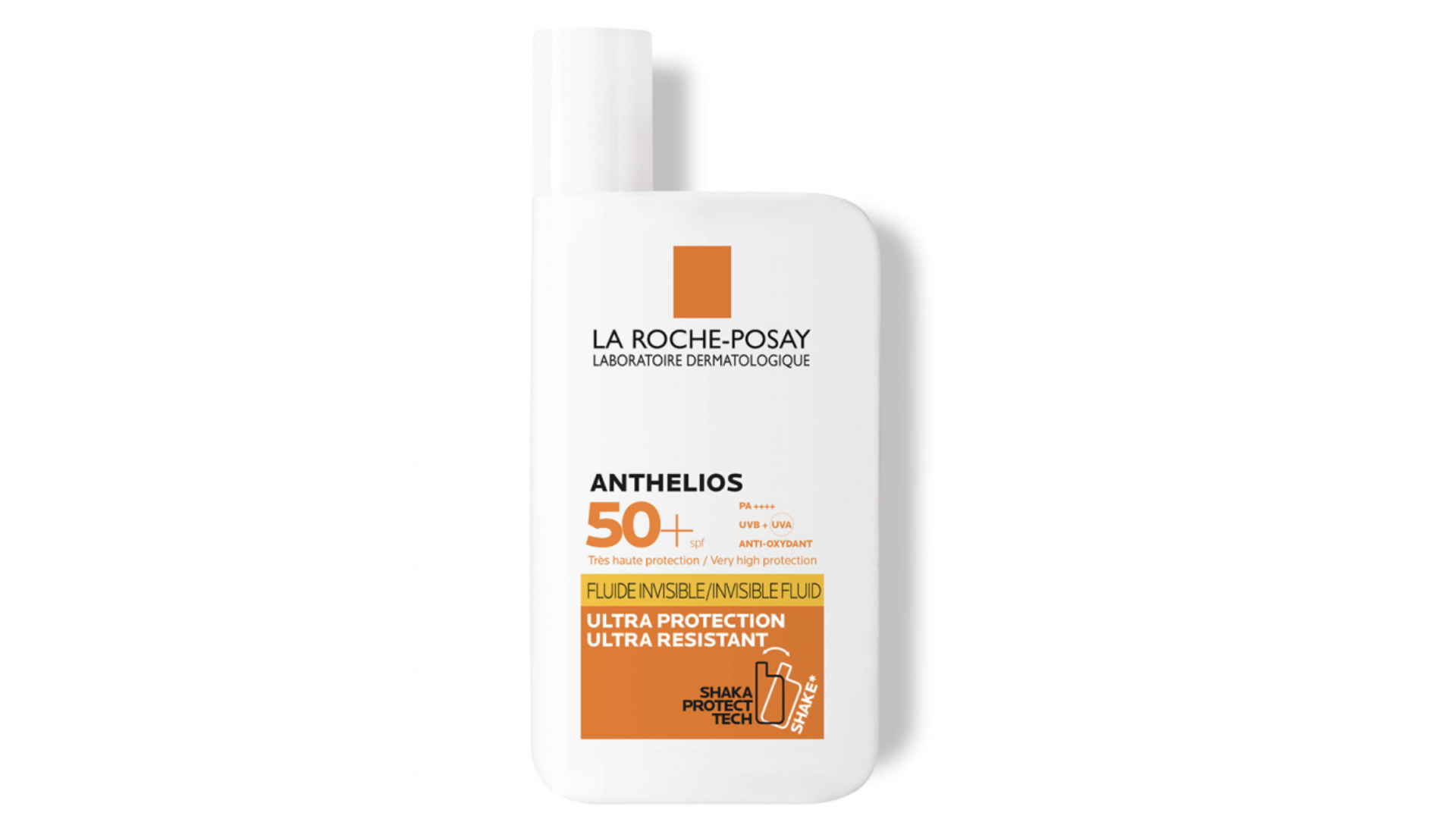
This suncream is designed to be used on your face rather than your entire body, but we wanted to include it as it really deserves a mention. La Roche-Posay is often praised for its skin-friendly formulas, and this SPF50 is no different, boasting a lightweight fluid that glides onto the skin and absorbs quickly for fast protection. It’s been created for particularly sensitive skin and boasts increased UVA protection (PPD46). This PPD46 - which means Persistent Pigment Darkening - is higher than European standards and means it takes 46 times longer for skin to darken after UVA exposure.
GoodtoKnow verdict: Our Beauty Editor, Stephanie says, "While this cream costs nearly £20 per bottle, I find it lasts me a couple of months (at least) - even when I apply it every day. It's the best SPF I’ve tried and doubles up as a brilliant primer for make-up. It has a fairly strong fragrance but absorbs really well into the skin, leaving a glowy finish without my skin feeling weighed down or sticky. This SPF is very runny and comes out fast so you have to be careful not to waste any. I do find, however, that despite its white colour, it dissolves without leaving a white cast."
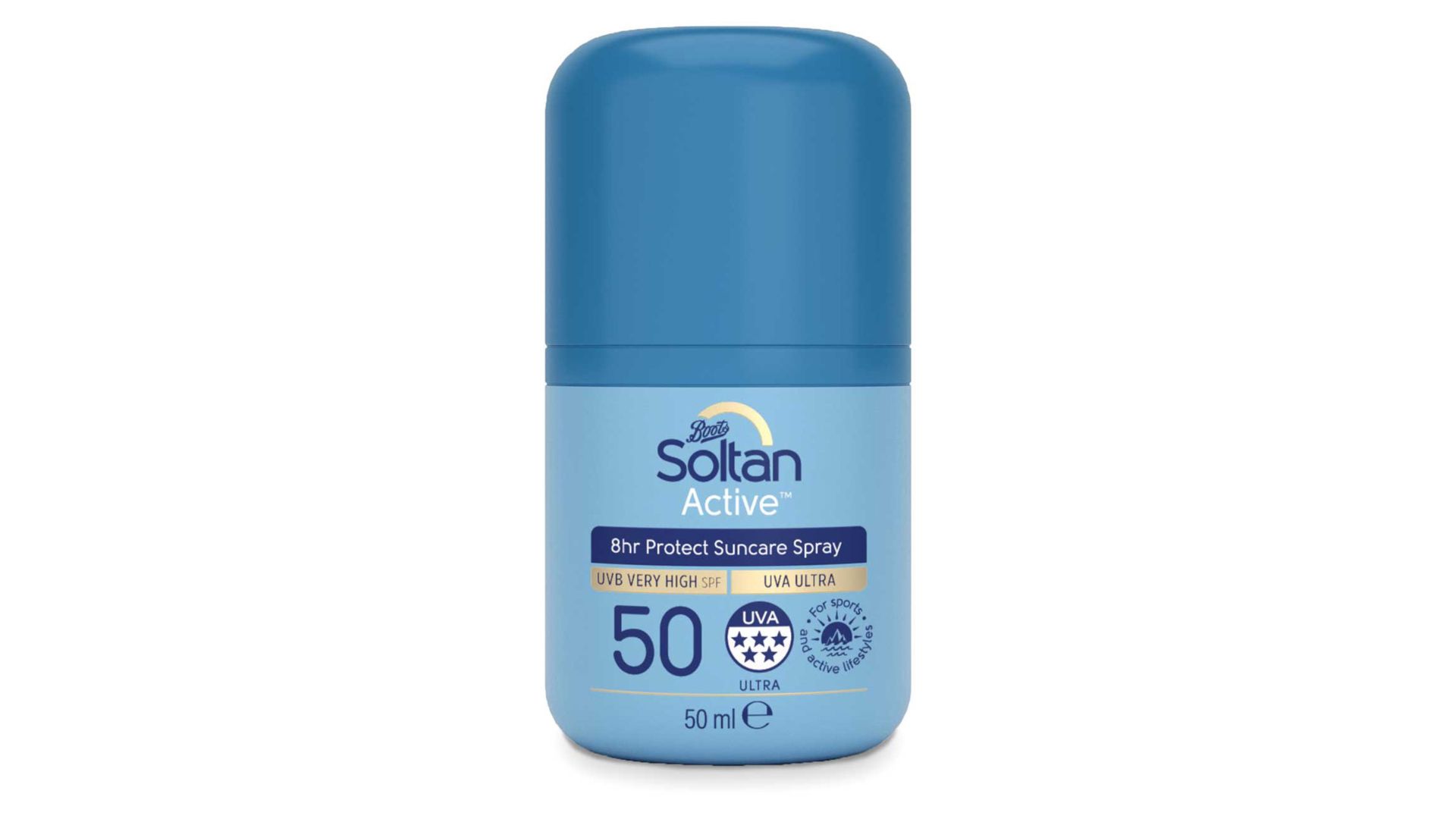
It was Boots who originally created the five-star system, which shows the level of UVA defence, so you can always rely on Soltan to provide very high and reliable protection. This new Active range is designed for those people who don't spend their holidays lying in a sunlounger - who run, who ski, who play beach volleyball. Delivering eight hours of sun protection, including three hours in the water from just a single application.
GoodtoKnow verdict: Our Beauty Editor, Stephanie says, "I tested this sun cream while out on a run, and it certainly lives up to its name - and felt heavy duty despite my sweat. When applied, it absorbed into my skin immediately and wasn't greasy at all, and the silky lotion left no white cast. It was light, but not runny, and gave a decent dose of sunscreen with every spritz so I knew I had adequate coverage. The bottle is small so would only probably last a few days if you were applying it regularly but it's so handy for throwing in your handbag or rucksack."
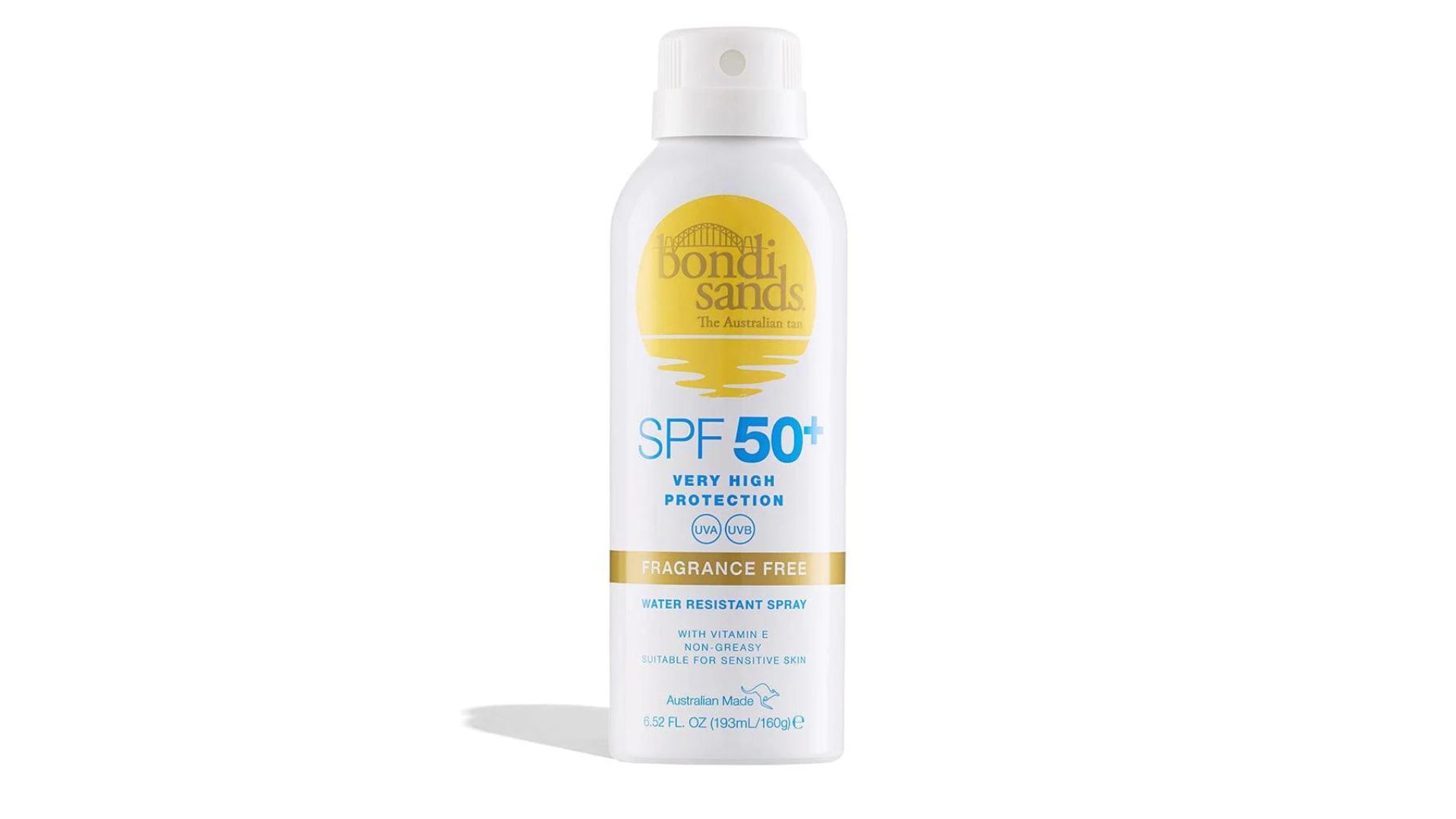
Formulated with vitamin E to soothe sensitive skin, this five-star UV rating sun cream absorbs quickly into the skin to provide a non-greasy, gentle feel that is water resistant for up to four hours. While available in a tube and pump bottle too, we've chosen to include the aerosol version for its ease of use and application.
GoodtoKnow verdict: Our Beauty Editor, Stephanie says, "I'm not usually an advocate for aerosols because they are much less environmentally friendly than other products, but I have to say they're very convenient when it comes to applying sun cream. With this Bondi Sands product, it's super easy to get an even coverage and make sure every inch of your skin is protected."
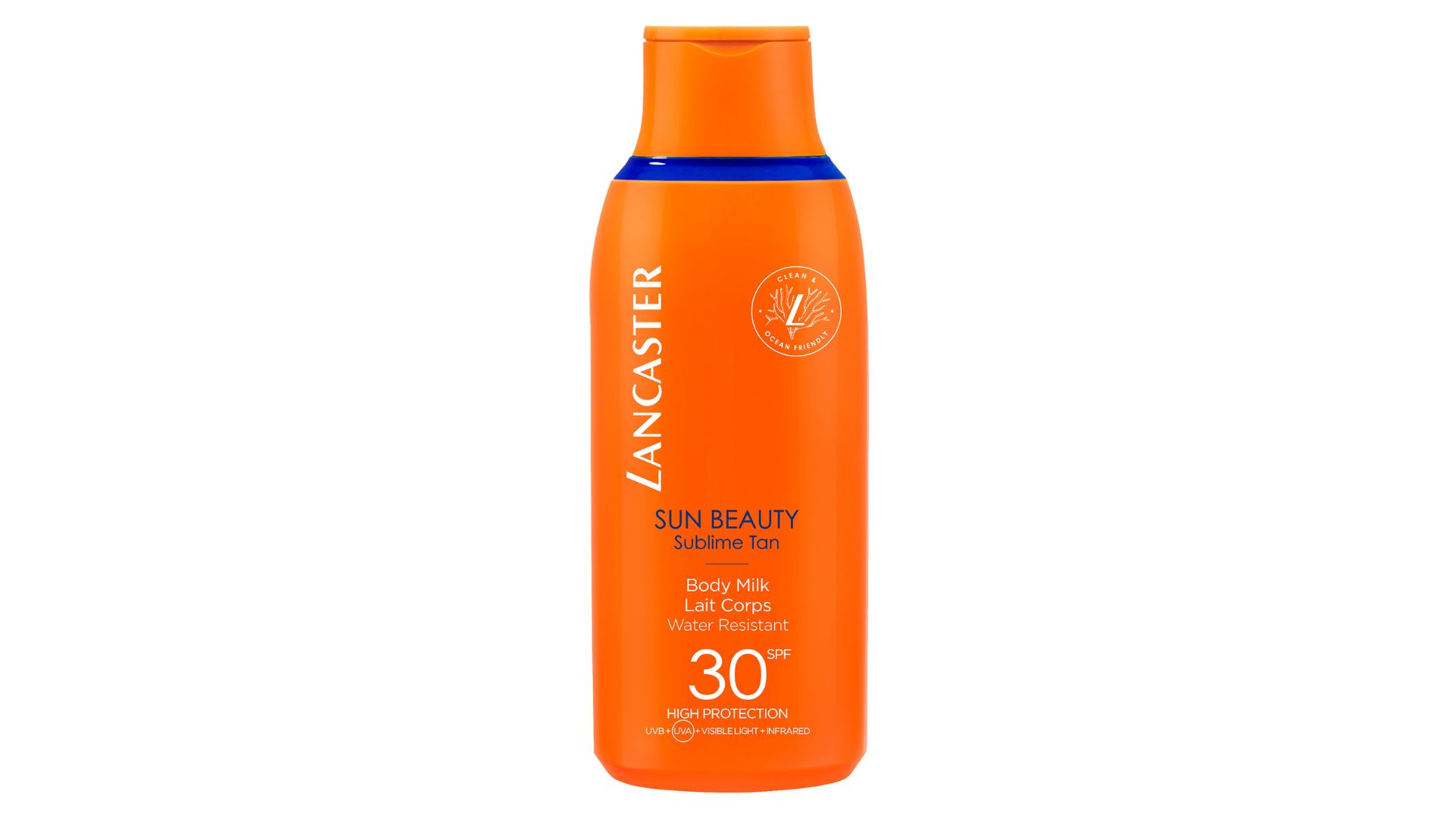
While this sun cream is a more expensive option - priced at just shy of £30 for a 250ml tube - you certainly get what you pay for with Lancaster Beauty. It's a brand loved by celebrities (rumoured to be The Princess of Wales' SPF choice) and is designed for those seeking a golden tan while keeping safe from harmful rays. While this product doesn't share its UV rating on the packaging, it promises to target 100% of the sun spectrum, and has the added benefit of being vegan and ocean-friendly.
GoodtoKnow verdict: Our Beauty Editor, Stephanie says, "This Lancaster Beauty sun cream feels so good on the skin - it has a beautiful consistency, and although it takes a minute to sink in, once it does it's not greasy or sticky at all. I also love the subtle smell and many customer reviews have praised this too. It doesn't leave a white cast, which is unusual for a mineral sun cream - although I noticed one reviewer mentioned that it had left a stain on their clothes."
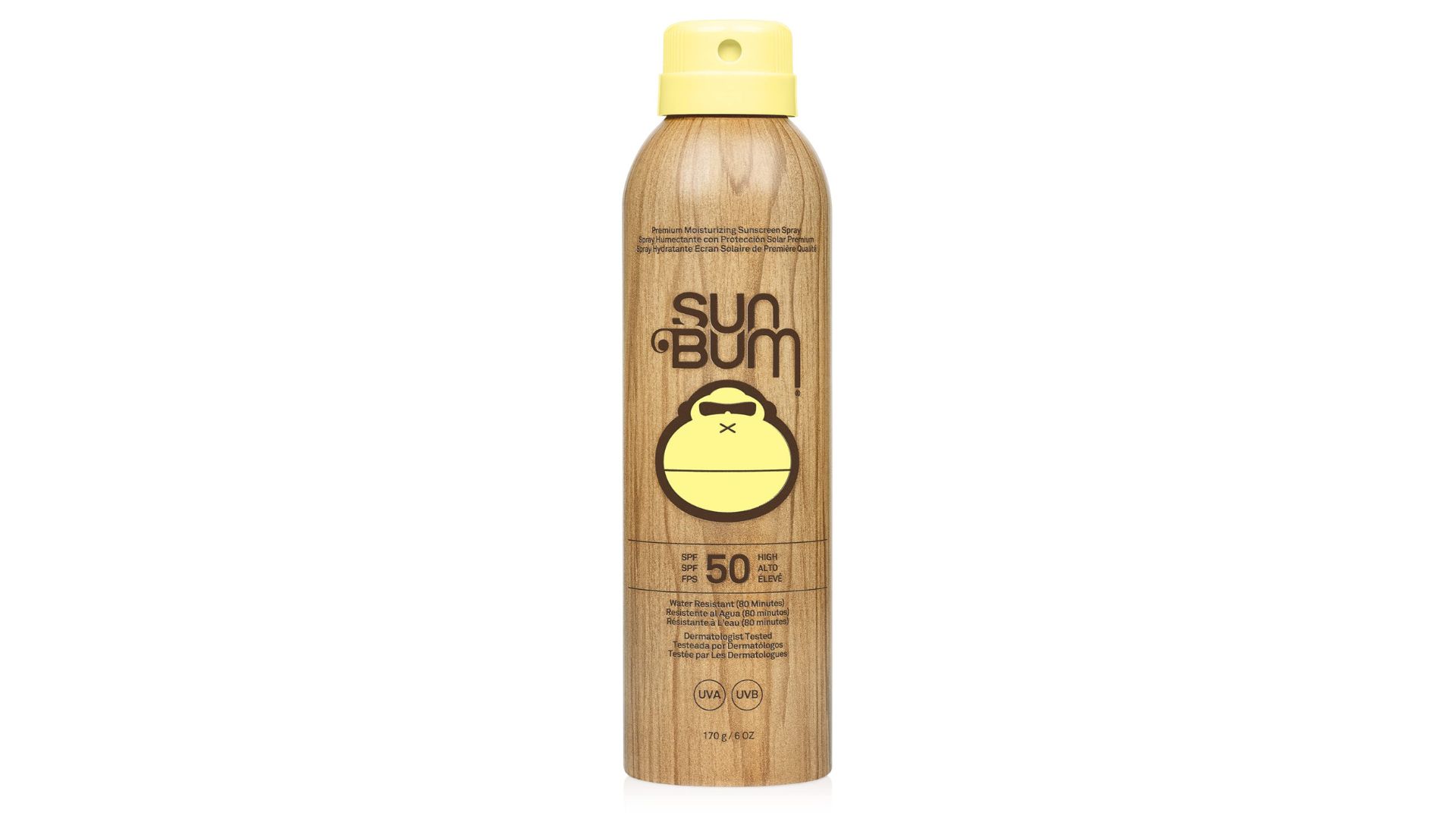
Water resistant for 80 minutes with a dry touch consistency and easy application, there's not much more you could want in a sun cream that this Sun Bum product doesn't already have. It's also antioxidant enriched to neutralise free radicals - which are one of the main causes of premature skin ageing - and dermotologically tested, but what we love most about this sun cream is its scent.
GoodtoKnow verdict: Our Beauty Editor, Stephanie says, "I love a sun cream in spray form, especially one that absorbs quickly and doesn’t leave a white cast or sticky residue. But what I love most about this Sum Bum spray is the smell - it smells delicious, like coconut with a hint of vanilla. I like to apply it super liberally and then rub it in, and it’s really easy to reapply. Plus, I’ve got fair skin and tend to burn quite easily, and have never burned while using this. I’ve also got the lip balm too."
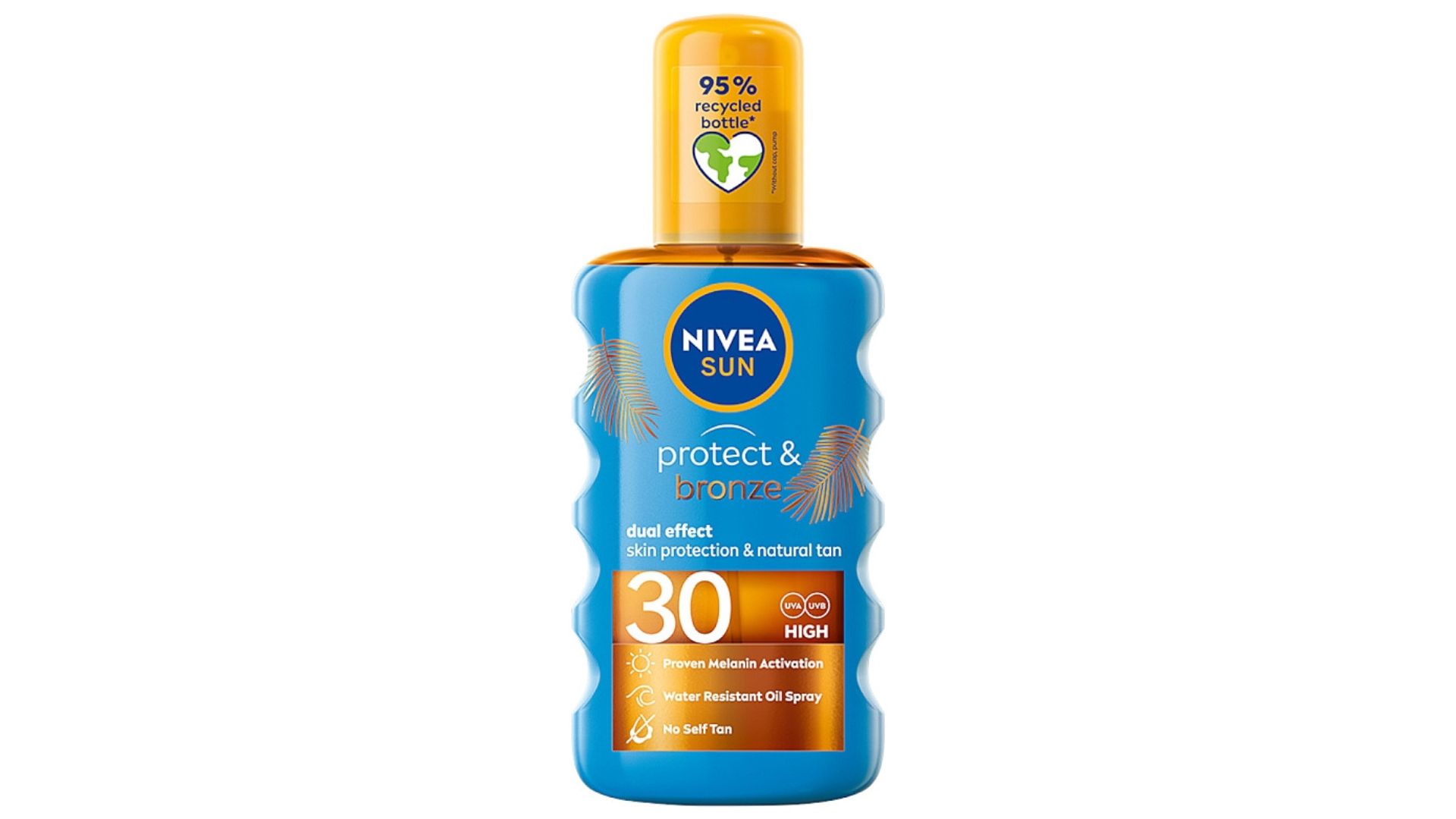
You've probably heard the phrase "there's no such thing as a healthy tan" before - and while it's true that the best thing for your skin is to stay out of the sun altogether when the UV is high, we know that most of us look forward to getting a natural bronze glow when the sun comes out. If that sounds like you then Nivea Protect and Bronze is the way to go, as this product has a 4-star UV rating and also contains natural pro-melanin extract to stimulate the skin's natural tanning process.
GoodtoKnow verdict: Our Beauty Editor, Stephanie says, "This product ticks all the boxes for me - it has a spray nozzle for easy application, and the formula sinks in quickly and doesn't leave my skin feeling greasy at all. The 200ml bottle goes a long way too, and it's great to have an option that appeals to people who want to tan as safely as possible."
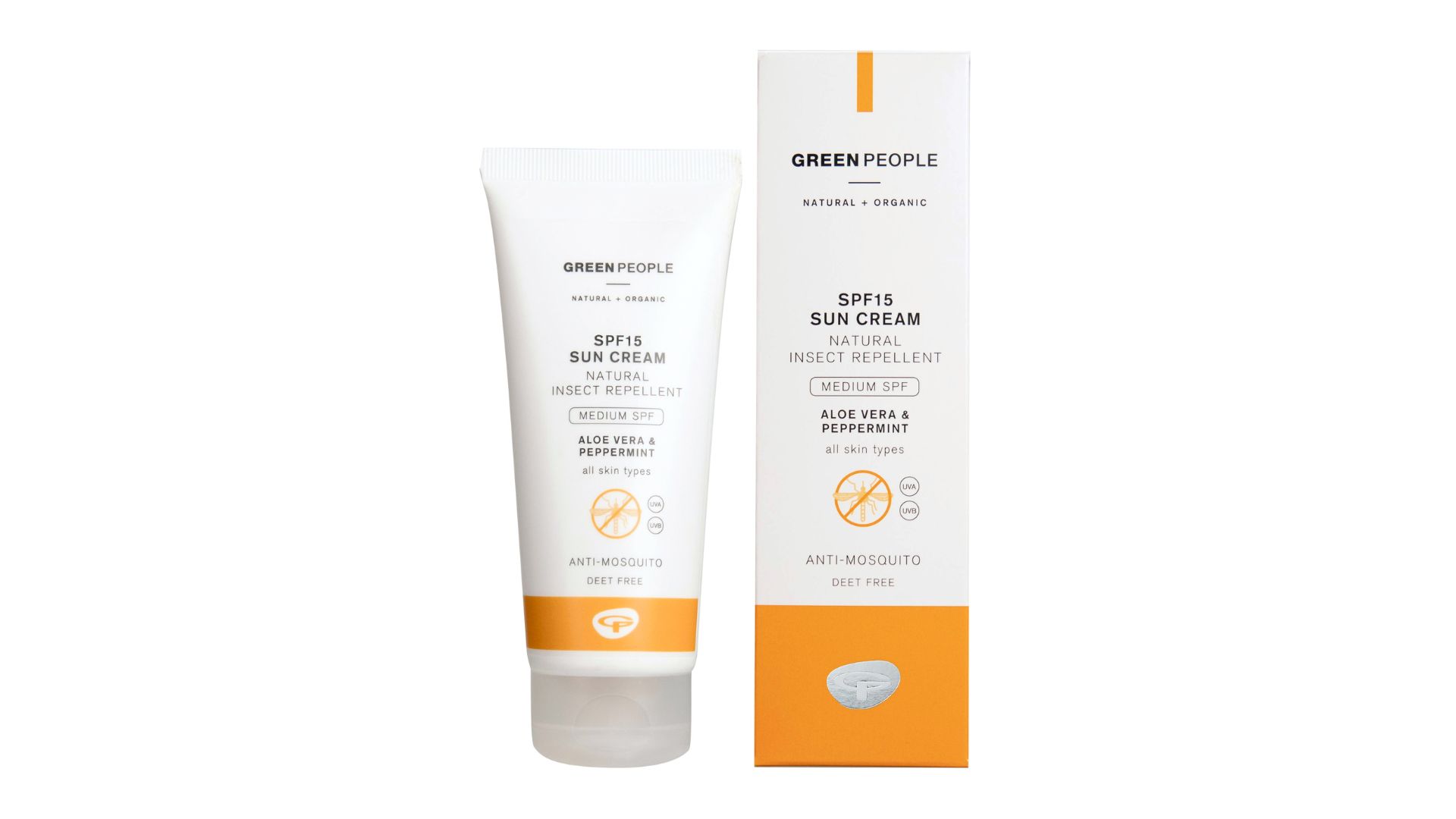
If you’re bitten alive during the warmer weather, this organic sunscreen will help keep bites at bay. On top of mineral sun protection - great for sensitive skin types - the deet-free formula includes a natural repellent - Citrepel®75 - to ward off mozzies, midges and other biting insects for up to four hours.
GoodtoKnow verdict: Our Beauty Editor, Stephanie says, "I usually always get bitten on holiday so I've been using this to see if it prevents me from becoming a tasty treat for mosquitoes. So far, so good. It's a shame it's not available in a higher factor, but it's lovely and light, and doesn't smell like a lot of deet-based repellents. In fact, it's the peppermint that really comes through."
What to consider when looking for the best sun creams
There are a number of criteria to consider when choosing the best sun cream for your skin, and these include sun protection factor (SPF), UV protection, water resistance and sun cream type - as well as ease of application and how it feels on your skin.
- SPF: The Sun Protection Factor refers to the level of UVB protection. SPF indicates how long it may take you to get burned after applying sun cream, and is measured in numbers. The higher the SPF number, the more time you may be able to spend in the sun without getting burned. An SPF30 shields against 97% of UVB rays, while SPF50 filters out 98%.
- UVA protection: Sun creams receive a UV star rating out of 5, which measures how well a sunscreen protects against the sun’s UVA rays. Some bottles don’t use the star rating system and instead use the letters ‘PA’ followed by plus signs, a rating system developed in Japan. Broad-spectrum sun creams protect against both UVA and UVB rays. When the UVA logo is circled, it means that the product contains at least the minimum UVA protection recommended by the European Commission. UVA are the long-wave rays that cause your skin to age and wrinkle, and can lead to skin cancer.
- Water resistance: For a sun cream to be water resistant, it must have undergone testing to show that it stays effective for at least 40 minutes in the water. After this time, you will need to reapply.
- Suncream type: Mineral sun creams act as a physical barrier to block rays from penetrating the skin, while chemical sun creams absorb UV rays and turn them into heat. Mineral sun creams tend to contain ingredients suitable for sensitive skin, but can leave a white cast on the skin. Chemical sun creams don't leave a white cast and have a lighter consistency.
Dermatologist and cosmetologist Dr Eva Melegh told us: "If you are prone to sensitive skin or you are applying suncream to children’s skin then you it’s best to opt for mineral sun creams as opposed to chemical filter ones, as they have less chance of causing a skin reaction to sensitive skin. If you have sensitive skin a very helpful product is Kalme Undercoat which is designed to wear under sun creams to reduce the risk of skin reactions."
She adds: "No matter what sun cream you choose, always check for certified UV ratings. Sun protection (UV factors) are regulated and certified in most countries so always check that your suncream is certified."
Dr Paul Banwell, who runs The Banwell Clinic and is the previous head and founder of The Melanoma and Skin Cancer Unit (MASCU) in East Grinstead, agrees. He told us: "I cannot emphasise enough the importance of selecting a broad spectrum sunscreen, which will protect against UVB and UVA rays. UVB rays cause redness and sunburn as well as skin cancer, while UVA rays can also cause cancer as well as ageing of the skin. Newer sunscreens have infrared (IR) protection too and should be considered."
Sun creams to avoid: The warning signs to look out for
It's always best to choose sun creams that have an SPF of 30 or above, and a UV star rating of at least four stars, as these will protect you best. In addition, some sun creams contain chemicals that some people may find irritating or cause a reaction on their skin.
Dr Paul Banwell told us, "Some sunscreens use chemicals, such as oxybenzone, a known- allergen, and avobenzone to absorb UV rays, which can be detected in the body at harmful levels. Other ingredients that may cause reactions include benzophenones, cinnamates and dibenzoylmethane.
He adds, "Oxybenzone is another ingredient to avoid as it is easily absorbed by the skin and enters the bloodstream, and it can disrupt your hormones as well as causing terrible harm to the environment. I would avoid Octinoxate, which is harmful to coral reefs and can cause skin allergies as well as Avobenzone, which can cause high levels of irritation. You also need to avoid Retinyl Palmitate, which does not mix well with the sun. When mixed with the sun, it can be potentially cancerous."
It's also worth remembering that suncream does go out of date too, so make sure you're checking the expiration date and stocking up when you need to.
What factor sun cream should I use?
The NHS recommends using a minimum SPF of 30 to protect against UVB. However, Dr Paul told us that he recommends using SPF 50, as well as staying in the shade, wearing protective clothing and staying out of midday sun.
Dr Eva Melegh adds, "SPF30 is fine for general sun exposure, but apply a mineral SPF50 (stick blocks are great) on specific parts of the face or body if these areas are being particularly exposed to the sun. If your face or certain areas of skin are going to be super exposed to the sun for long periods then you should not only rely on suncream but wear a brimmed hat and sunglasses and cover the upper body with a rash vest or long-sleeved light cotton top. Sun cream alone cannot completely protect the skin from direct UV rays over a longer period of time."
"For children it’s crucial that a formula is both sensitive and has a very high UVB and UVA protection," adds Abi Cleeve. "Those with sensitive skin (and children), should opt for sunscreens that absorb easily and are fragrance free. Look out for non-comedogenic formulations to ensure your pores aren’t blocked, which help with breakouts or sun allergies like prickly heat."
How often should I reapply sun cream?
The NHS recommends reapplying sun cream every two hours, as the sun can dry it off your skin. They add that when applying sun cream for the first time that day you should do this twice: 30 minutes before going out and again just before leaving.
As skin care expert Abi Cleeve stresses, "Where you apply sun cream matters. Always apply sun protection to cool, clean, dry skin in the shade (ideally indoors) 15-30 minutes before you or your children go into the sun. It’s important that this step is followed, regardless of which sun cream brand you choose, as if applied in direct sunlight, up to 60% can evaporate from the skin’s surface before it has a chance to bond and therefore becomes less effective."
How much you apply matters too. "Most people apply sunscreen too thinly and that means protection is reduced," says Dr Paul. "An adult should be applying around six to eight teaspoons to cover their body. To help visualise this, some people use the two finger method. This works by squirting two fingers with sunscreen and applying two fingers to eleven different sections of the body, which include your head, face and neck, then left arm, right arm, upper back, lower back, chest, stomach, left upper leg, right upper leg, left lower leg and foot, right lower leg and foot. If you are using a spray, you want to apply until an even sheen appears all over the skin."
He added: "A higher SPF does not mean you need to re-apply it less often. Sunscreens with high SPF ratings block slightly more UVB rays, but none offers 100 per cent protection."
Looking for more of the best summer buys this year? Check out our picks of the best outdoor toys and the best paddling pools.
We spoke to the following skincare experts:







